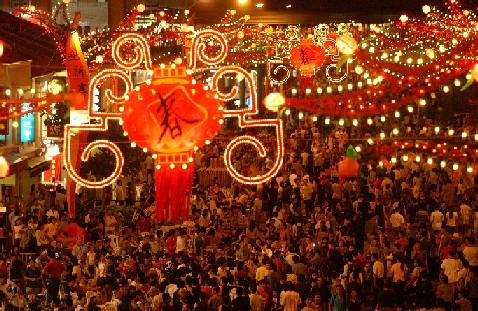The clock struck one, and firecrackers cracked continuously without a rest. I couldn’t fall asleep with noise thundering, so I sat beside the window, listening, watching and waiting for a peaceful night yet to come. I’m always ambivalent toward firecrackers: sometimes I hate them because they prevent me from a good night’s sleep; yet I love them because they excite me and remind me of such a big moment in China—Chinese New Year.
Similarly, I’m ambivalent toward Chinese New Year. I don’t dispute its importance in Chinese people’s lives, but it does bring happiness along with annoyance.
Every Spring Festival, many relatives visit my house, most of whom I only see twice a year. In fact, I’m afraid of seeing them because I’m just tired of being asked a barrage of questions—“How’s your study at school? What’s your rank? Which college will you attend? Where is your college?” Still, I cherish the opportunity to see them. In a larger sense, we are of the same family and same origin, and I can’t resist the ties of kinship.
CCTV’s New Year Gala equally arouses my ambivalence. CCTV held its first New Year Gala in 1983; it has since become a tradition on Lunar New Year’s Eve. It features amusing skits and Xiangsheng (stand-up comedy), various kinds of songs and dances and even magic tricks and acrobatics. Those programs are surely designed to appeal to Chinese audience of all ages, but I always grow bored after watching it for three or four hours. Honestly, I never expect the Gala to stir my interest, but still every Chinese New Year’s Eve, I sit in front of the television and wait for it to begin, probably just because it’s a tradition. I simply don’t want to give it up.
I’m afraid of seeing relatives, but I hope to know how they are doing; I complain about how boring the CCTV Gala is, but I keep watching it every New Year’s Eve. Such ambivalence makes me think what Chinese New Year actually means to me. Is it just a tradition? Do I really enjoy celebrating it? Where do my conflicting feelings come from?
Recently, many of my Chinese friends studying abroad told me they hoped to be at home during Chinese New Year. In foreign countries, they don’t have my troubles with firecrackers, relatives and the CCTV Gala, but at the same time, they can’t experience such a cheerful moment as I do.
From their views on Spring Festival, I get some answers to my confusions. Spring Festival includes many traditions—firecrackers, reunion dinner, even CCTV’s New Year Gala. Whatever my views on those traditions are, I have been growing up with them. We celebrate Chinese New Year more for the atmosphere it creates, which connects every one of us together in the cold winter days.
Next year, I’ll celebrate Chinese New Year with my peers in America. I’m ambivalent about Chinese New Year, but I believe next year my love for it will surely outweigh my complaints.
已是凌晨一点,而窗外的爆竹声接连不断,使我无法入睡。于是我坐在窗旁,听着鞭炮声,看着焰火,期待着一个安静的夜。我对鞭炮的感情总是矛盾的:有时我不喜欢它,因为它不但污染空气,还不能使人安宁;而有时我却对它爱不释手,毕竟鞭炮令人激动,并且使人想起中国人心中很重要的时刻——春节。
我对春节也有着矛盾的心情。我并不否认春节在中国人心中的地位,但它除了给我带来欢乐以外,也的确给我带来了不少烦恼。
每逢春节,都会有很多亲戚到我家做客,他们当中的很多人我一年也见不了两次。说实话,和他们见面时我总会多多少少地犯憷,因为我实在不喜欢他们见面时问的一大串问题:“你学习怎么样啊?”“你在学校排名多少啊?”“你要去哪个大学啊?”“你要去的大学在哪啊?”然而,我却又十分珍惜和他们见面的机会,毕竟我们是一家人,而我决不能对亲情说“不”。
中央电视台的春节联欢晚会也同样的使我内心充满着矛盾。春晚于1983年亮相,并从此成为了中国人庆祝春节的一个传统。春晚里有风趣的小品和相声,有形形色色的歌曲和舞蹈,还有魔术和杂技。这些节目的设计者一心想着迎合中国观众的胃口,但看了三、四个小时的春晚后,我总会觉得有些无聊。其实我从未期待春晚的节目吸引我,但每年除夕我都会坐在电视前等待它的到来。也许这只是一个我不想轻易放弃的传统吧。
我害怕见亲戚,但同时又想和他们见见。我抱怨春晚无聊,而每年却都看春晚。这些矛盾迫使我考虑春节对我而言真正的意义。春节只不过是一个传统吗?我真的喜欢过春节吗?我这些矛盾的心理又从何而来呢?
最近有许多在海外留学的朋友向我诉说他们回家过年的心愿。在国外,他们不会有我对鞭炮、亲戚和春晚的烦恼,但他们却体会不到庆祝春节愉悦的时刻。
他们对春节的渴望帮我解开了一些疑惑。春节包括很多传统——鞭炮、团圆饭、春晚。不论我对这些传统有什么感情,它们一路陪伴着我成长。我们庆祝春节,是为了体验春节创造的特殊气氛——那种团聚家人,驱除寒冷的气氛。
明年,我将在美国和朋友们庆祝春节。尽管我对春节有着矛盾的心理,我相信到了明年的此时,我会更加珍爱这个节日的。


